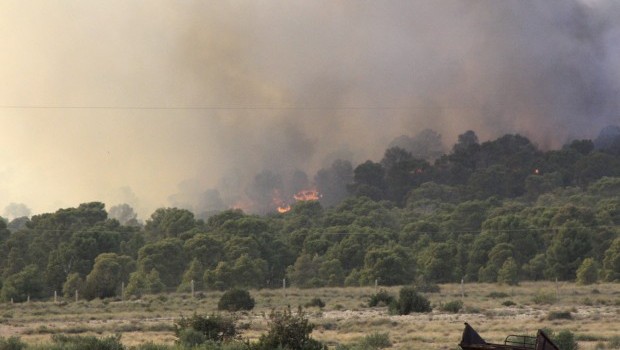Tunis, Asharq Al-Awsat—The Tunisian armed forces targeted armed Islamists with airstrikes along the Algerian border on Monday, according to a military source.
This follows the killing of a number of suspected militants and the arrest of four others on Sunday, as the country’s political crisis worsened and the rift between the ruling Islamist party and their opponents deepened.
Witnesses and military sources told the Reuters news agency that the army carried out airstrikes on Monday against armed Islamists that were hiding in the Mount Chaambi region. A military source added that the armed forces captured four armed men while pursuing them on Sunday, describing that “the air force spotted many charred bodies of terrorists,” but did not mention any figures.
The warplanes bombed hiding places in the Mount Chaambi area, where security forces and the army have been pursuing gunmen since December, and where eight soldiers were killed at the end of last month. The attack was one of the deadliest in Tunisia over the past few decades.
Military sources leaked a large volume of information following the capture of Mohammed Habib Al-Omri, a 23 year old, on the night of Eid Al-Fitr.
According to information obtained during the investigation into Al-Omri, Seifullah Bin Hassine, also known as ‘Abu Iyad Al-Tunisi,’ who is the leader of the Salafi-Jihadist group Ansar Al-Shari’a, visited the mountains. Kamal Al-Qadqadi, the original suspect in the assassination of the Tunisian opposition leader Chokri Belaid, was also present. The two had “prayed with them.”
16 had been involved in the assassination operation, including six Algerians, and the group was “divided into four units, each consisting of four terrorists,” the sources added. In reaction, they explained, military patrols attacked from all directions at a sharp corner on the only road that leads to leads to Mount Chaambi.
The same sources suggested that confrontations with the armed group had since transferred from the Chaambi Mountain to the neighboring Mount Samama, highlighting also that foreign elements were present in the region. These included two Nigerian and two Malian individuals, as well as on Mauritian and seven Algerians—one of whom is the leader of the group.
The government, headed by Ali Laarayedh, the leader of the Ennahda party, has come under increasing political pressure over terrorist attacks that have been ongoing in the Chaambi region since the end of April in 2012. Opposition groups have demanded that parliament be dissolved and called for the government to resign.
In the meantime, Samir Taieb, a spokesman for the opposition Democratic and Social Path alliance (Al-Massar), said that the political body of the National Salvation Front will announce the formation of a new government led by the Ennahda movement on Tuesday August 13, Tunisian Women’s Day.
In a statement to Asharq Al-Awsat, Taieb said that plans for a new cabinet and prime minister had been drawn up. He said: “The proposed names cannot be publicly announced before a consultation with the bodies of the national dialogue,” meaning the General Union of Tunisian Workers, the Tunisian Union of Industry and Trade, the Tunisian League for Human Rights, and the National Bar Association.
Taieb said that announcing the formation of the recovery government on Tunisian Women’s day has many political implications, including upholding the rights of women within the civil state. He also pointed out the great participation of Tunisian women in the sit-in protest which ran for more than two weeks in front of the headquarters of the Constituent Assembly, Tunisia’s parliament, in Pardo Square in the capital of Tunisia.
It is expected that political parties, associations, civil society organizations, and professional bodies under the banner of “Union of Tunisia’s Free” will organize a large popular movement that stems from Bab Saadoun Square towards Pardo Square where the protest is taking place.
The National Salvation Front (FIS) demanded that the Constituent Assembly be dissolved and the government resign in order to form an interim government for six months, composed of 15 to 20 ministers who will not be eligible for reelection.
The name “Mokhtar Trifi,” the former president of the Tunisian League for Human Rights, circulated among more than one Tunisian political party. It is suggested that he is the figure who can take over prime minister and cooperate with the Popular Front Coalition led by Hamma Hammani. The name Wided Bouchamaoui, the current president of the Federation of Industry and Commerce, was also added to the list of prime ministerial candidates.
Bouchamaoui was quick to declare that she “is not interested in any political post or responsibility and that enhancing the Tunisian economy is her main concern.”

